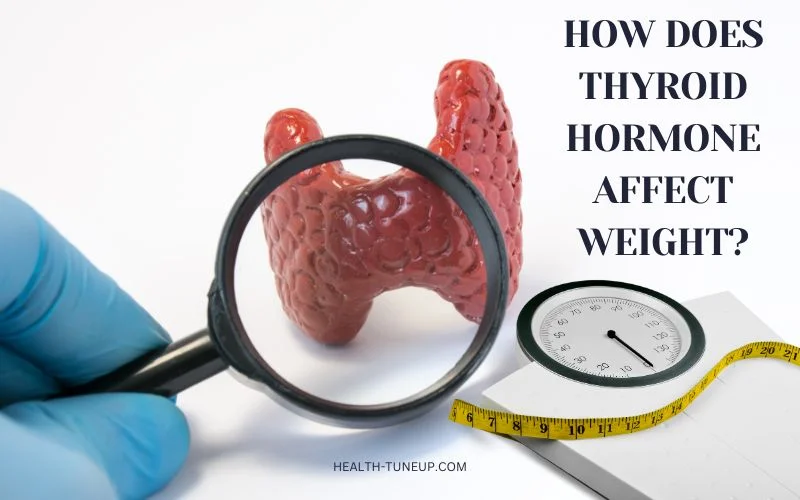If you are struggling with your weight and can’t find any possible reason behind it then your hormones specifically thyroid hormones can have a role in it.
The thyroid hormone is one of the most essential human hormones that regulates many bodily functions like metabolism and bone health.
But how does thyroid hormone affect weight?
Well, the basic functioning of thyroid hormone relates to the metabolic function of our body.
Thus, even the slightest disruption in the hormonal balance can lead to problems in weight management.
Although there is a common misconception that thyroid hormone only causes weight gain, in certain conditions it can also lead to major weight loss.
So, let’s try to understand the effects of the thyroid on weight and how to fix thyroid weight gain or weight loss issues.
What Does the Thyroid Do?

There are several glands present in our endocrine system that regulate different hormone production.
Among them, the butterfly-shaped gland which is present in the middle of our throat is known as the thyroid gland.
The thyroid gland is the largest endocrine gland that stimulates the production of three specific hormones which are: Thyroxine (T4), triodothyronine (T3), and Calcitonin.
Iodine and Tyrosine are two major minerals that play a crucial role in the production of these “Thyroid hormones”.
As per the reports of a study published in the Annals of Pediatric Endocrinology & Metabolism, both excess and well as deficiency of iodine are associated with an increased risk of thyroid disorders.
But what is the importance of these hormones in our well-being?
Thyroid hormones have a key role in contributing to human growth and development. It heavily stimulates metabolism, body temperature, and appetite regulation. It also affects the muscle strength and body weight.
Also Read: What Can I Take to Lose Weight and Suppress Appetite?
How Thyroid Hormone Impacts Weight?
When it comes to interruption in weight management, we often neglect the role of hormones.
But essential hormones like the thyroid can severely affect our weight and lead to some chronic conditions.
So, how does thyroid hormone affect weight?
Thyr0id hormone releases triiodothyronine (also known as T3) and thyroxine (also known as T4) into the bloodstream.
Our optimal well-being greatly depends upon the activity of the thyroid gland, if it becomes overactive or underactive, both can cause serious impact.
These are then distributed throughout the body and facilitate the body’s use of energy, oxygen conversion, and food into energy and keep the muscles running.
The overactivity of the thyroid gland is known as hyperthyroidism and the underactivity of the thyroid gland is called hypothyroidism. Both of these situations can impact individual weight management.
#1. Hypothyroidism and Weight
When the thyroid gland becomes less active it cannot meet the essential amount of thyroid hormone.
If the natural flow of thyroid hormones gets disrupted it can negatively impact the metabolism and basal metabolic rate of individuals.
This particular situation is known as Hypothyroidism. There are several symptoms related to hypothyroidism and unexpected weight gain is certainly one of those.
The weight gain in this condition happens as a direct result of the downfall of metabolism.
Our body can’t burn calories as energy therefore it starts to get fat as fat cells. This is how does hypothyroidism cause weight gain in individuals.
#2. Hyperthyroidism and Weight
The counter condition of hypothyroidism is hyperthyroidism in which the thyroid gland becomes overly active.
This leads to the over-secretion of thyroid hormones. One of the major symptoms of hyperthyroidism is unexplained weight loss.
But why does it happen? During the condition, the basis BMR rate tends to increase therefore the essential calorie requirement starts to increase.
The abnormally fast metabolism in this condition can burn more calories than one is consuming therefore it leads to severe weight loss and even muscle loss.
Additionally, it can also cause the malabsorption of nutrients which can leave the affected one in a malnourished situation.
So, this is the basic pattern of the activity of the thyroid gland and how thyroid hormone affects weight in both ways.
Does this mean thyroid hormones can help manage the weight?
Can Thyroid Hormones Help Regulate Weight?

Well, according to several studies and research, it is evident that maintaining the natural production and normal activity of thyroid hormones can help manage a healthy weight.
The optimal TSH level for weight loss, depends on the age and gender of the individual. It is generally between 0.5 mg-5.0 mIU/L in males and 0.4-4.0 mIU/L.
As per the reports published in a research, change in serum TSH, and change in weight were significant in both the sexes. Weight increased by 0.3 kg in women and 0.8 kg in men for every one-unit TSH (mU/L) increase.
Therefore, in order to have a healthy weight, it is crucial to have a balanced level of thyroid hormones. Generally, most of the people deal with weight gain due to hypothyroidism.
Knowing how does thyroid hormone affect weight is of no use if you don’t know how to fix it.
How to Fix Thyroid Weight Gain?
Regulating thyroid weight gain can be challenging as it is not quite easy to maintain hormonal secretion effectively. Some methods, which can help are:
#1. Choosing the right diet becomes essential in maintaining any hormonal imbalance, including thyroid hormones.
Iodine deficiency is a major reason for the malfunctioning thyroid gland. Try to consume food items that are high in iodine such as seafood, seaweed, chicken, and nuts.
#2. If you are wondering how to stop weight gain with hypothyroidism, then certain supplements can also be helpful.
One of the most prominent supplements which you can give a try, is PhenQ. PhenQ is a revolutionary natural weight loss supplement that targets specific aspects of weight loss.
PhenQ also contains iodine as one of its key ingredients, which makes it more capable of dealing with thyroid weight gain. You can buy PhenQ in New Zealand, the UK, the USA, South Africa, and around the world from its official website only.
#3. Taking up some essential lifestyle changes is important to deal with thyroid-related weight gain.
Exercise regularly, regulate stress levels and most importantly you’ve to get enough sleep for the proper functioning of the thyroid gland.
#4. Getting enough sleep is one of the basics for maintaining a hormonal balance.
Lack of sleep affects the hormones and leads to fatigue, making the thyroid functioning worse.
#5. Getting enough vitamin D is also one of the important ways to regulate the thyroid hormones.
You can either fulfill the requirement via dietary food intake and bask in the sun or simply take vitamin D supplements.
So, these are the most effective ways to deal with your thyroid weight gain symptoms.
Thyroid hormone does affect weight and is one of the prominent reasons for weight gain these days.
For those who experience fatigue, brain fog, or weight gain, managing and balancing thyroid hormones can be an effective way to maintain health.
Final Thought
After going through the discussion you must have an idea about how does thyroid hormone affect weight.
In the context of fluctuation in thyroid hormone, it is important to note that not necessarily everyone may experience weight gain.
If someone is going through unexplained weight loss, then also it might have a link with an imbalance in thyroid hormones.
Keeping thyroid hormones in check is essential for not only maintaining a healthy weight, but it is also important to maintaining optimal good health.
Hope you find this blog informative and i you liked this blog, please share it with your friends who are experiencing weight gain and weight loss issues.
